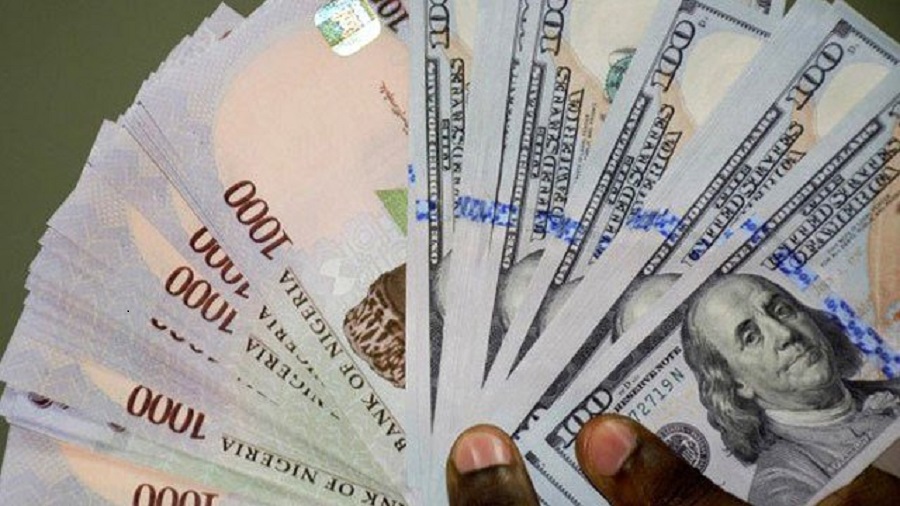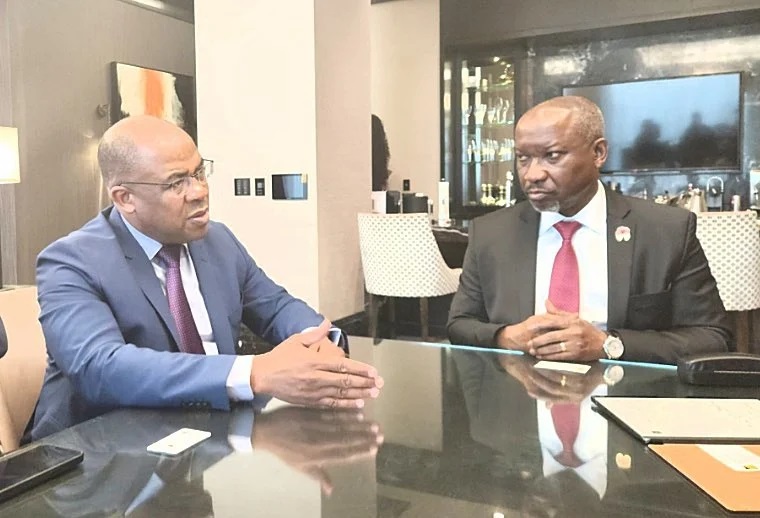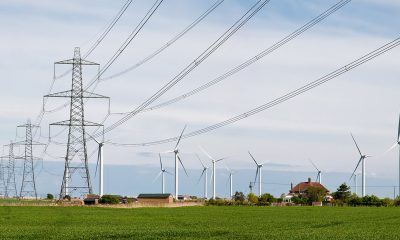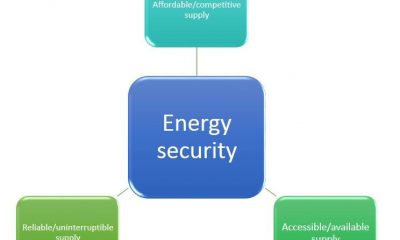Economy
Ways to Achieve Energy Security in Nigeria—Saraki


By Dipo Olowookere
Senate President, Mr Bukola Saraki, has listed steps needed to be taken to achieve energy security in the country, which will eventually lead to safe environment and uplift the social economic wellbeing of the people.
Mr Saraki, while speaking on Friday at a one day workshop on the State of Energy Security in Nigeria, organized by the Konrad Adenauer Stiftung (KAS) climate policy and energy security programme for sub-Saharan Africa in Lagos, said Nigeria must look inwards to provide the required capital to invest in energy infrastructure by reforming the administration of current major source of revenue, improving other revenue generating sectors and instituting an economic diversification framework that could initiate a stepwise transition to a green economic development pathway.
The Senate President, represented by his Chief of Staff, Mr Hakeem Baba Ahmed, noted that it was key for the country to deepen strategic partnerships with countries that have more experience and resources to build capacity for policy coherence and technology transfer in order to generate made in Nigeria energy access innovations to grow the Naira.
While further giving the recommendations in his speech, Mr Saraki said the 8th National Assembly firmly believes that the supply of adequate and affordable energy mix was essential and should be a complimentary means to achieve energy security.
He said, “Nigeria must deepen strategic partnerships with countries that have more experience and resources to build our capacity for policy coherence and technology transfer to generate made in Nigeria energy access innovations to grow the Naira.
“The 8th National Assembly and the Senate under my leadership believes that the supply of adequate and affordable energy mix is essential in the 21st century, and there cannot be any pretense about this.
“But it should be a complimentary means to achieve energy security because energy security can only be achieved through adequate investments that are coherent and consistent.
“Looking inwards to provide the required capital to invest in energy infrastructure means reforming the administration of our current major source of revenue, improving other revenue generating sectors, and instituting an economic diversification framework that could initiate a stepwise transition to a green economic development pathway. I believe that this is the best way to go if we truly want to achieve sustainable energy security in Nigeria.”
He further stated that since revenue derived from oil is highly volatile, fixing gaps leading to revenue leakages in the petroleum industry need to be addressed before implementing any policy for energy sufficiency and sustainability.
He said that the passage of the Petroleum Industry Governance Bill (PIGB) by the 8th Senate is meant to reform the oil industry and make it more revenue efficient and investment friendly.
“Nigeria’s mono-economic revenue profile derived from oil is highly volatile as it depends on global oil price shocks thereby affecting government budgetary framework and by extension, the entire economy,” Saraki said. “Therefore, fixing the lacuna in the oil and gas sector have to be tackled first before implementing any policy frameworks and reforms that can give a robust energy base for the nation.
“As a result, last week Thursday, the 8th Senate made history by breaking a 17 years jinx by passing the first part of the Petroleum Industry Governance Bill for the reform of the petroleum industry.
“The bill established a framework for the creation of commercially oriented and profit-driven petroleum entities that fosters a conducive business environment for the petroleum industry operations that ensures value addition, promote transparency and accountability in the administration of petroleum resources of Nigeria.
“The bill applies to the rights, interests, obligations and liabilities of the petroleum industry in Nigeria and establishes a regulatory commission, the Ministry of Petroleum Incorporated, the National Petroleum Company, the Nigeria Asset Management Company and a Fund which shall defray expenditures of the commission,” he said.
The Senate President stated that if a village of less than 10000 inhabitants in Feldheim can cooperate to achieve 100 per cent renewable energy supply, states in Nigeria can replicate the feet by partnering with the private sector.
He said that his vision is for the country to liberalize the energy situation in such a way that all segments of the populace can have uninterrupted access to power to support and uplift their social, economic and educational wellbeing.
He said further that, “In March this year, I visited the 100% Renewable energy village of Feldheim near Berlin and was impressed by the fact that a small village of less than 1000 people was able to form an energy cooperative that generate energy from renewable sources such that surpluses are sold to the national grid. That experience was an eye-opener for my delegation that if a small village in Germany can develop such an energy model, why can’t one state in Nigeria do it in partnership with the private sector?
“The 8th National Assembly is working hard to pass the necessary laws to achieve energy security and we will continue to do this with effective support from partners like everyone in this room.
“We acknowledge that in order to fundamentally create a robust and secure energy base, strategic and deliberate government policy both short and long terms that will guarantee the present and future energy needs is necessary.
“Together we can help liberalize the energy situation in Nigeria in such a way that the rural woman can cook with a clean cookstove and fuel; the school pupil can wake up at night and have light to do his/her home-work; the farmer can power coolers to preserve his/her milk and prevent post-harvest losses; the barber and hair-dresser can make more money with regular energy access; the industrialist will no longer want to close shop and move to Ghana,” he said.
Economy
Naira Extends Losing Streak, Falls to N1,356/$1 at NAFEX

By Adedapo Adesanya
A 74 Kobo or 0.05 per cent decline was recorded by the Naira against the United States Dollar in the Nigerian Autonomous Foreign Exchange Market (NAFEX) on Wednesday, February 25, trading at N1,356.11/$1 compared with the N1,355.37/$1 it was traded on Tuesday.
The Nigerian currency also further depreciated against the Pound Sterling during the session in the official market by N6.70 to settle at N1,834.96/£1 versus the preceding day’s rate of N1,828.26/£1, and against the Euro, it tumbled by N4.94 to quote at N1,598.59/€1 compared with the previous session’s N1,596.36/€1.
In the same vein, the Nigerian Naira lost N6 against the Dollar at the GTBank forex desk to close at N1,367/$1, in contrast to N1,361/$1 it was exchanged a day earlier, and in the parallel market, it traded flat at N1,365/$1.
The continuation of the decline of the local currency has been tied to the Central Bank of Nigeria (CBN) buying US Dollars from the market to slow the rapid rise of the Naira.
The apex bank bought about $189.80 million to reduce excess Dollar supply and control how fast the Naira was gaining value.
The monetary policy committee (MPC) of the CBN on Tuesday reduced interest rates by 50 basis points to 26.50 per cent from 27 per cent after inflation eased in January 2026, a move analysts say is the best not to unsettle FX market, especially the Foreign Portfolio Investors (FPI_ inflows which have anchored much of the recent supply and weakened the recently restored monetary credibility.
“The 50bps move therefore provides a clear directional signal while still keeping overall monetary conditions restrictive, indicating the start of a shallow, data-dependent easing cycle rather than a radical shift to accommodative policy,” said Mr Kayode Akindele, CEO, Coronation Capital and Head, Coronation Research in an email.
As for the cryptocurrency market, benchmarked tokens rebounded in double digits, driven by bearish positioning and thin liquidity rather than by clear fundamental catalysts, with Cardano (ADA) growing by 16.2 per cent to $0.3015, and Solana (SOL) appreciating by 12.3 per cent to $88.66.
Further, Ethereum (ETH) surged 11.9 per cent to $2,076.66, Litecoin (LTC) expanded by 11.5 per cent to $57.15, Dogecoin (DOGE) rose by 11.5 per cent to $0.1025, Binance Coin (BNB) advanced by 7.6 per cent to $629.76, Ripple (XRP) jumped 7.2 per cent to $1.45, and Bitcoin (BTC) added 6.4 per cent to sell for $68,136.72, while the US Dollar Tether (USDT) and the US Dollar Coin (USDC) remained unchanged at $1.00 apiece.
Economy
Oil Prices Stabilise as US Crude Build Counters Supply Disruption Threat

By Adedapo Adesanya
Oil prices settled largely unchanged on Wednesday amid a build in American crude stockpile and the threat to oil supply from potential military conflict between the US and Iran.
Brent futures chalked up 8 cents to trade at $70.85 a barrel, while the US West Texas Intermediate (WTI) futures settled lost 21 cents to close at $65.42 per barrel.
Crude oil inventories in the US increased by 16 million barrels during the week ending February 20, according to new data from the US Energy Information Administration (EIA) released on Wednesday.
The decrease brings commercial stockpiles to 435.8 million barrels according to government data, which is still 3% below the five-year average for this time of year.
The EIA’s data release follows figures by the American Petroleum Institute (API) that were released a day earlier, which reported that crude oil inventories rose by a massive 11.4 million barrels in the period.
The market continued to weigh the possibility extended conflict could disrupt supplies from Iran, the third-biggest crude producer in the Organisation of the Petroleum Exporting Countries (OPEC) and other countries in the Middle East.
US President Donald Trump verbally attacked Iran, saying he would not allow a country he described as the world’s biggest sponsor of terrorism to have a nuclear weapon.
This comes as US envoys are due to meet an Iranian delegation for a third round of talks on Thursday in Geneva, Switzerland.
Reuters reported that OPEC+ is considering raising its oil output by 137,000 barrels per day for April to end a three-month pause in production increases. This is as the group prepares for peak summer demand and tensions between the US and Iran boost prices.
Eight OPEC+ producers – Saudi Arabia, Russia, the United Arab Emirates, Kazakhstan, Kuwait, Iraq, Algeria and Oman – meet on March 1.
An increase of 137,000 barrels per day for April would be the same as those agreed for December, November and October last year.
In a separate development, Saudi Arabia has activated a plan for a short-term oil output and export surge in case a US strike on Iran disrupts flows from the Middle East, said two sources familiar with the Saudi plan.
Tariff uncertainty also further worried investors after President Trump’s temporary global tariff of 10 per cent took effect on Tuesday after the Supreme Court’s sweeping ruling last week. He later said the levy would be 15 per cent, but it was unclear when and if it would apply.
Economy
LIRS Urges Taxpayers to File Annual Returns Ahead of Deadline

By Modupe Gbadeyanka
All individual taxpayers in Lagos State have been advised to file their annual tax returns ahead of the March 31 deadline.
This appeal was made by the Lagos State Internal Revenue Service (LIRS) in a statement issued by its Head of Corporate Communications, Mrs Monsurat Amasa-Oyelude.
The notice quoted the chairman of LIRS, Mr Ayodele Subair, as saying that timely filing remains both a constitutional and statutory obligation as well as a civic responsibility.
The statutory filing requirement applies to all taxable persons, including self-employed individuals, business owners, professionals, persons in the informal sector, and employees under the Pay-As-You-Earn (PAYE) scheme.
In accordance with Section 24(f) of the 1999 Constitution of the Federal Republic of Nigeria, Sections 13 &14(3) of the Nigeria Tax Administration Act 2025 (NTAA), every individual with taxable income is required to submit a true and correct return of total income from all sources for the preceding year (January 1 to December 31, 2025) within 90 days of the commencement of a new assessment year.
“Filing of annual tax returns is not optional. It is a legal requirement under the Nigeria Tax Administration Act 2025. We encourage all Lagos residents earning taxable income to file early and accurately.
“Early and accurate filing not only ensures full adherence with statutory requirements, but supports effective monitoring and forecasting, which are critical to Lagos State’s fiscal planning and long-term sustainability,” Mr Subair stated.
He further noted that failure to file returns by the statutory deadline attracts administrative penalties, interest, and other enforcement measures as prescribed by law.
To enhance convenience and efficiency, all individual tax returns must be submitted electronically via the LIRS eTax portal at https://etax.lirs.net. The platform enables taxpayers to register, file returns, upload supporting documents, and manage their tax profiles securely from anywhere.
In keeping with global best practices, Mr Subair reiterated that LIRS continues to prioritise digital tax administration and taxpayer support services. He affirmed that the LIRS eTax platform is secure and accessible worldwide. Taxpayers requiring assistance may visit any of the LIRS offices or other channels.
-

 Feature/OPED6 years ago
Feature/OPED6 years agoDavos was Different this year
-
Travel/Tourism10 years ago
Lagos Seals Western Lodge Hotel In Ikorodu
-

 Showbiz3 years ago
Showbiz3 years agoEstranged Lover Releases Videos of Empress Njamah Bathing
-

 Banking8 years ago
Banking8 years agoSort Codes of GTBank Branches in Nigeria
-

 Economy3 years ago
Economy3 years agoSubsidy Removal: CNG at N130 Per Litre Cheaper Than Petrol—IPMAN
-

 Banking3 years ago
Banking3 years agoSort Codes of UBA Branches in Nigeria
-

 Banking3 years ago
Banking3 years agoFirst Bank Announces Planned Downtime
-

 Sports3 years ago
Sports3 years agoHighest Paid Nigerian Footballer – How Much Do Nigerian Footballers Earn























